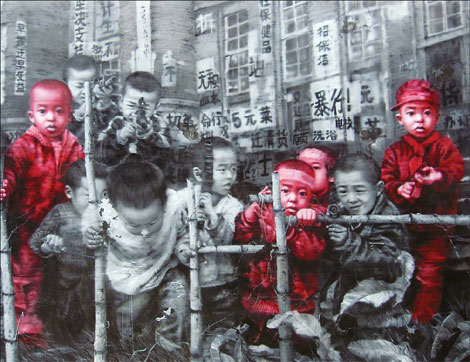


Artist finds it hard to connect with his childhood in China, Zhang Kun reports.
Li Tianbing dreamed about becoming an "international artist" when he was a 10-year-old in the East China's Jiangxi province.
Ten years later, it seemed Li was on the right track to go "international" by studying at the University of International Relations in Beijing. But it looked more likely he would turn out to be a diplomat rather than an artist.
Li decided to follow the route of Xu Beihong, whose biography planted the dream of being an international artist, and applied to study at France's Ecole suprieure des Beaux-Arts de Paris at the age of 21.
"I learned Chinese ink painting since childhood, but beside that, I had no systematic art training," Li said before the opening of his first exhibition in Shanghai, at the Contrast Gallery.
"I was accepted, but some well-trained Chinese students who could paint very well were turned down. My professors believed it easier to work on a blank canvas rather than pouring water in a filled bucket."
Li realized his dream, graduating from university and becoming an artist in Paris in 2002. "I often came back to my hometown to visit, every time trying to find my childhood memories, but I am frequently disappointed to find all the old schools are gone, old houses removed and everything changed," he said. "All I had from my childhood are five photographs of me as a child."
Three or four years ago, Li started to reconstruct his childhood experience on canvas, using the images of these five photographs to create oil paintings.
"It's a traditional concept in China, what we call 'pictures of 100 children', which symbolizes good fortune and other auspicious meanings," he said. "I want my own version of that traditional form, to tell my own story."
These paintings reflect both his recovery of the past, where boys engage in battle games in front of propaganda posters, pose for pictures in army uniforms, or are surrounded by high walls and loudspeakers.
In 2008, Li built a studio in suburban Beijing. "I was excited to see workers finish all the interior decoration within a month. The same amount of work took almost a year in Paris," he said, marveling at Chinese efficiency. But less than a year later, the whole community was torn down. "Only then did I realize speed is not necessarily good," he said.
He painted these issues, such as the giant Chinese character "chai" (to be torn down) in white chalk on old walls as the background of his childhood portrait. By involving in the discussion about contemporary Chinese society from his cross-cultural point of view, he blurred the distinction between past and present, taking his childhood self back and forth through the tunnel of space and time.
If you go
Until Oct 5
Contrast Gallery
1F, 181 Jiangxi Road M
021-6323-1989